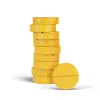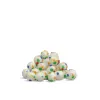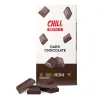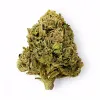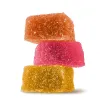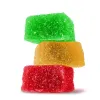In recent years, the cannabis community has witnessed a surge in the popularity of delta 8 products, drawing the attention of enthusiasts and consumers alike. Delta 8 THC, a lesser-known cannabinoid found in cannabis plants, has carved its niche in the market due to its unique properties. Unlike its more well-known counterpart, delta 9 THC, delta 8 offers a milder psychoactive experience, making it an appealing choice for those seeking a more balanced and manageable high.
One of the factors contributing to delta 8's growing popularity is its legal status in certain regions. While the legal landscape surrounding cannabis can be complex, delta 8 enjoys a somewhat more favorable standing in some areas, as it falls within a legal gray area in comparison to delta 9 THC. This legal nuance has prompted a surge in delta 8 product availability, with enthusiasts eager to explore its effects and benefits. As consumers become more curious about this unique cannabinoid, the market for delta 8 products continues to expand, with a variety of options ranging from edibles to vape cartridges now readily accessible.
As delta 8 gains momentum within the cannabis community, its increasing popularity reflects the evolving preferences and demands of enthusiasts seeking alternative ways to experience the plant's effects. This shift underscores the dynamic nature of the cannabis industry, where lesser-known cannabinoids like delta 8 are emerging as intriguing options for those looking to explore the vast spectrum of cannabis experiences.
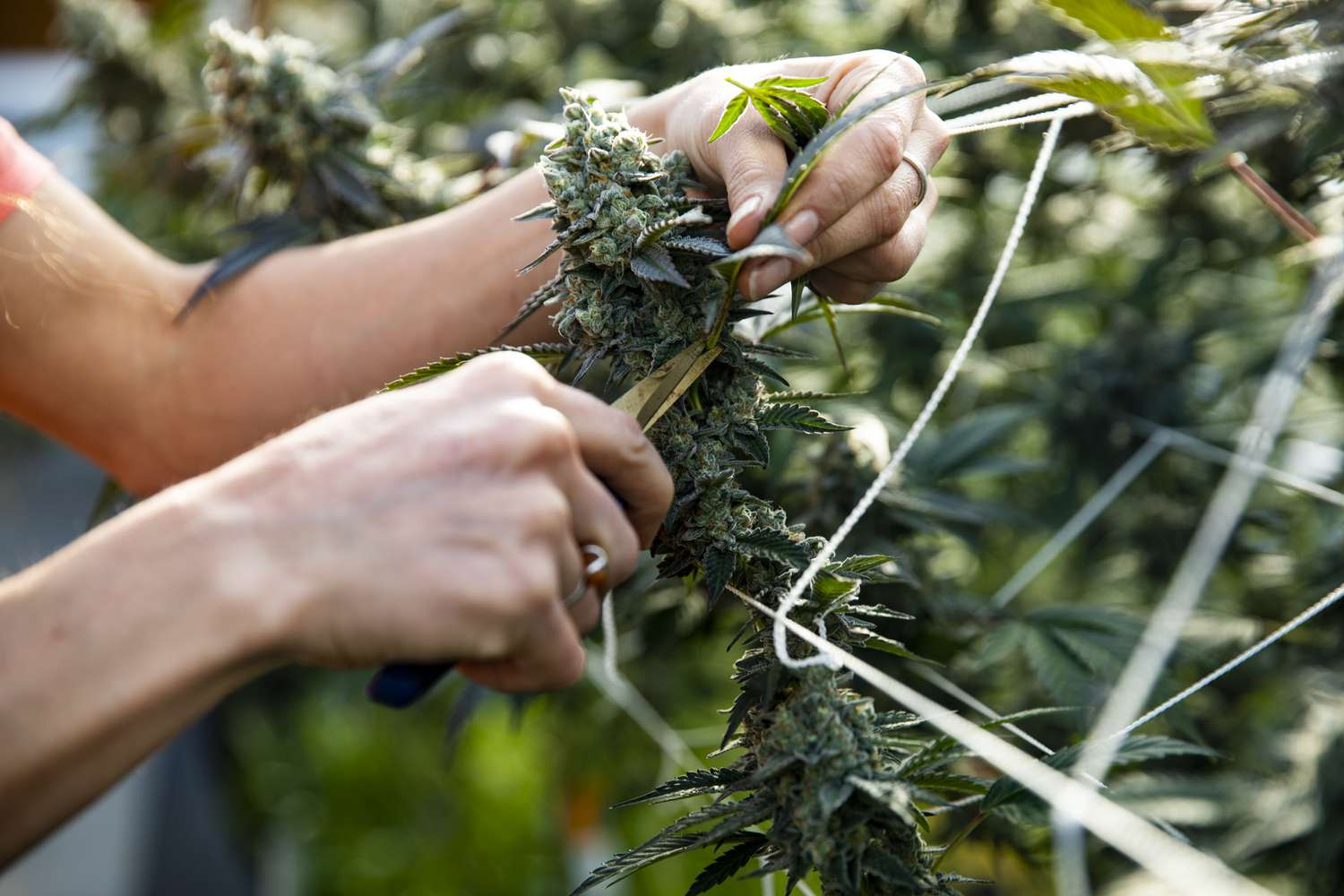
What is Delta 8?
Delta 8 THC (Δ8-THC) is a naturally occurring cannabinoid found in cannabis plants, although typically in much smaller quantities compared to delta 9 THC (Δ9-THC). It shares a similar chemical structure with delta 9 THC, with a notable difference in the placement of a double bond in their molecular structures. This slight difference in chemical arrangement leads to distinct effects when consumed.
Delta 8 THC, like delta 9 THC, is composed of carbon, hydrogen, and oxygen atoms arranged in a specific configuration. The key distinction is that delta 8 THC has the double bond on the 8th carbon atom in its molecular chain, whereas delta 9 THC has it on the 9th carbon atom. This difference in structure affects how the two compounds interact with the endocannabinoid system in the human body, resulting in varying psychoactive effects.
Comparison with Delta 9 THC
Delta 8 THC is known for its milder psychoactive effects compared to delta 9 THC. Users often report a less intense, more clear-headed high, with reduced anxiety and paranoia. This makes delta 8 THC an attractive option for individuals seeking the therapeutic benefits of THC without the sometimes overwhelming or anxiety-inducing effects associated with delta 9 THC.
Comparison from CBD
Delta 8 THC can be created through a chemical conversion process from cannabidiol (CBD), another cannabinoid found in cannabis. This conversion typically involves exposing CBD to specific conditions, such as heat, light, or acidic environments, which prompts the rearrangement of its molecular structure to form delta 8 THC. The legality of this conversion process can be complex, as it often hinges on whether the resulting delta 8 THC product contains any delta 9 THC, which remains a controlled substance in many jurisdictions.
In summary, delta 8 THC is a cannabinoid with a slightly different chemical structure than delta 9 THC, resulting in milder psychoactive effects. It can be created from CBD through a chemical conversion process, but the legal status of delta 8 THC products can vary by region and depends on the presence of delta 9 THC. Delta 8 THC has gained popularity among individuals seeking a more balanced and manageable cannabis experience.
Does Delta 8 Get You High?
Delta 8 THC does have psychoactive effects, meaning it can get you high, but these effects are generally milder when compared to the high produced by delta 9 THC (the more well-known form of THC). Here's a breakdown of delta 8's effects and a comparison with delta 9 THC:
Euphoric and Relaxing Effects
Delta 8 THC can induce feelings of euphoria and relaxation, similar to delta 9 THC. Users often report a sense of well-being, mild euphoria, and a reduction in anxiety and stress. These effects can create a pleasant and enjoyable experience for many users.
Intensity of the High
The high produced by delta 8 THC is typically described as less intense than that of delta 9 THC. It's often characterized by a more clear-headed and manageable experience. Users tend to report fewer instances of anxiety, paranoia, or racing thoughts that can sometimes occur with delta 9 THC.
Positive Effects:
-
Euphoria and a sense of happiness.
-
Relaxation and stress reduction.
-
Increased sociability and creativity.
-
Pain relief and potential therapeutic benefits.
Negative Effects:
-
Dry mouth (commonly referred to as "cottonmouth").
-
Red eyes.
-
Increased heart rate (tachycardia).
-
Potential dizziness or lightheadedness.
-
Short-term memory impairment (similar to delta 9 THC).
It's important to note that individual reactions to delta 8 THC can vary. Some users may experience stronger effects, especially with higher doses, while others may find the effects very subtle. Additionally, delta 8 THC's legality can vary by region, so it's essential to be aware of local laws and regulations if you're considering trying delta 8 products.
Overall, delta 8 THC can provide a milder high compared to delta 9 THC, making it an appealing option for those who seek the benefits of THC with reduced intensity and potential for anxiety or discomfort.
Does Delta 8 Show Up on a Drug Test?
Delta 8 THC's potential to show up on drug tests underscores the importance of informed decision-making for individuals in various situations. While its milder psychoactive effects have drawn many users, it's crucial to weigh the potential risks, especially if you are in a profession or situation where drug testing is routine. Understanding the local legal landscape and being aware of the specific testing methods used can help individuals make informed choices about delta 8 THC use.
In the event of a positive test result, individuals should familiarize themselves with the procedures for retesting if available. While navigating the intersection of delta 8 THC and drug testing can be complex, careful consideration and proactive measures can help individuals make informed choices that align with their personal and professional needs.
How Long Does Delta 8 Stay in Your System?
The duration of Delta 8 THC staying in your system can vary based on several factors, including usage frequency, individual metabolism, and the type of drug test conducted. Here's an overview:
Factors Influencing Duration
-
Usage Frequency: The more frequently you use delta 8 THC, the longer it is likely to stay in your system. Regular or heavy users may have detectable levels for a more extended period.
-
Metabolism: Individual metabolism plays a significant role. Some people naturally process and eliminate substances from their bodies faster than others.
-
Method of Consumption: How you consume delta 8 THC can affect how long it stays in your system. Edibles and tinctures, for example, may remain detectable slightly longer than smoked or vaped forms.
-
Dosage: Higher doses are more likely to result in longer detection times.
-
Hydration: Staying well-hydrated may help flush substances from your system more quickly.
Estimations for Detection
-
Urine Testing: The most common method can typically detect delta 8 THC up to 30 days after use, with varying detection windows based on usage frequency. For instance, single-use may be detectable for about 3 days, while chronic heavy use could be detectable for over 30 days.
-
Blood Testing: Blood tests usually detect recent use within hours to a few days.
-
Saliva Testing: Saliva tests can detect delta 8 THC for up to 24 hours, though in heavy users, it may persist for up to 72 hours.
-
Hair Follicle Testing: Hair tests are highly sensitive and can detect delta 8 THC for an extended period, often up to 90 days or more after use.
It's important to note that these estimations are general guidelines, and individual factors can influence the detection period. Regular users, for instance, may have delta 8 THC metabolites persist in their system for longer periods. If you anticipate being subjected to drug testing and want to avoid a positive result, the safest approach is to abstain from delta 8 THC use in the weeks leading up to the test. Always consider the local legal regulations regarding delta 8 THC, as they may vary from one jurisdiction to another.
Tolerance to Delta 8
Tolerance to cannabinoids, including Delta 8 THC, is a phenomenon where the body becomes less responsive to the effects of the substance over time with repeated use. This means that as you consume delta 8 THC regularly, your body adjusts to its presence, and you may require higher doses to achieve the same desired effects. Here's a breakdown of tolerance development, its impact, and strategies for managing or resetting tolerance:
Tolerance Development
Tolerance occurs as a result of the body's adaptive mechanisms. When you consume delta 8 THC consistently, your body's endocannabinoid receptors, which are part of the endocannabinoid system, can become less sensitive to the compound. This leads to a decreased response to the same amount of delta 8 THC. Tolerance can develop to both the euphoric and therapeutic effects of delta 8 THC.
Impact on Potency and Effects
As tolerance to delta 8 THC develops, you may find that the same dosage no longer produces the desired level of potency or effects. This can lead to several consequences, including the need to consume more delta 8 THC to achieve the same effects, increased risk of side effects or discomfort, and potential financial costs associated with higher consumption.
Managing and Resetting Tolerance:
-
Tolerance Breaks: One effective strategy is to take a "tolerance break" or "tolerance reset." This involves abstaining from delta 8 THC for a period of time, allowing your body to readjust to lower levels of the compound. The duration of the break can vary but is typically several days to a few weeks.
-
Dose Reduction: If you don't want to take a complete break, you can try reducing your delta 8 THC dosage. This can help prevent rapid tolerance development and keep your consumption more efficient.
-
Alternate Cannabinoids: Consider exploring other cannabinoids, such as CBD or CBG, alongside or in place of delta 8 THC. These cannabinoids may have different effects and may help reduce tolerance to delta 8 THC.
-
Stay Hydrated and Maintain a Healthy Lifestyle: Good overall health can contribute to more efficient processing of substances like delta 8 THC. Staying hydrated and engaging in regular physical activity can help.
-
Consult a Healthcare Professional: If you're concerned about tolerance or its impact on your consumption habits, it's advisable to consult with a healthcare professional or addiction specialist. They can provide personalized guidance and support.
In summary, tolerance to delta 8 THC is a natural response of the body to regular consumption. It can lead to reduced potency and effects over time. Managing or resetting tolerance can involve tolerance breaks, dose reduction, exploring other cannabinoids, and maintaining a healthy lifestyle. Always prioritize responsible and informed use of cannabinoids to achieve the desired effects while minimizing potential risks.
How is Delta 8 Made?
The production of Delta 8 THC involves a sophisticated lab-based process where CBD, often sourced from industrial hemp plants, is converted into delta 8 THC. This conversion is achieved through an isomerization reaction, where the molecular structure of CBD is rearranged to form delta 8 THC. Stringent quality control measures, including purification and testing, are integral to this process to ensure the final product's purity, potency, and safety.
When considering delta 8 THC products, sourcing from reputable manufacturers is paramount. These manufacturers prioritize adherence to legal regulations, transparency, and rigorous testing. By choosing products from trustworthy sources, consumers can enjoy the potential benefits of delta 8 THC while minimizing risks associated with impurities or mislabeling, ultimately ensuring a safe and reliable experience.
Is Delta 8 Safe?
Delta 8 THC has gained attention for its potential therapeutic benefits and milder psychoactive effects compared to delta 9 THC. However, the safety of delta 8 THC is a topic of concern, especially in the context of unregulated products.
The safety of delta 8 THC largely depends on the source and quality of the product. Delta 8 THC products are less regulated than delta 9 THC in many regions, which means there's a risk of impurities, inaccurate labeling, and potentially harmful additives in unregulated products. It's crucial for consumers to choose delta 8 THC products from reputable and licensed manufacturers who adhere to strict quality control standards and provide lab-tested products.
From a medical standpoint, delta 8 THC's safety profile appears to be better than delta 9 THC, mainly due to its milder psychoactive effects and potentially reduced risk of causing anxiety or paranoia. However, individual responses can vary, and caution should be exercised when using any psychoactive substance, especially if you have a history of mental health issues or substance abuse.
How Much THC is in Delta 8?
Delta 8 THC products typically contain lower THC levels compared to their delta 9 THC counterparts. While delta 8 THC concentrations can vary between 10% to 80%, delta 9 THC products, including many cannabis strains, can reach levels of 10% to 30% or even higher. This difference in potency is one reason why delta 8 THC is often considered a milder alternative for those seeking the benefits of THC without the intensity associated with delta 9 THC.
When it comes to dosing delta 8 THC, a "start low and go slow" approach is advisable. New users should begin with very small doses, while occasional users can opt for slightly higher amounts. Regular users may require more delta 8 THC for the desired effects, but it's still important to exercise caution and titrate gradually to avoid overconsumption. It's crucial to adjust dosages based on individual tolerance and response.
For those considering delta 8 THC, especially if they are new to cannabis, it's essential to adhere to local legal regulations, consume responsibly, and be aware of the potential for delayed effects with edibles. Finding the right dose can lead to a positive and enjoyable experience while minimizing potential risks.
Is Delta 8 Legal?
The legal status of Delta 8 THC in the United States is complex and varies depending on federal and state regulations. Here's an overview of the key factors that influence its legality:
2018 Farm Bill
Under the 2018 Farm Bill, hemp and its derivatives, including CBD, were made legal at the federal level as long as the hemp contains no more than 0.3% delta 9 THC by dry weight. Delta 8 THC, which can be derived from hemp, was not explicitly mentioned in the Farm Bill, leading to some legal ambiguity.
State-by-State Variability
While some states have explicitly legalized delta 8 THC, many others have taken steps to regulate or restrict it. Some states have even explicitly banned delta 8 THC products. The legality of delta 8 THC at the state level can vary significantly, and consumers should be aware of the specific regulations in their state.
Overall, the legal status of delta 8 THC is in flux, and it's crucial for individuals to check their state's laws and regulations. Federal and state regulations can change over time, impacting the legality of delta 8 THC products. Consumers should exercise caution, especially in states with stricter regulations, and purchase delta 8 THC products from reputable sources to ensure product quality and compliance with local laws.
Flying with Delta 8
Flying with Delta 8 THC can be legally complex, as it hinges on the interplay of state laws, federal regulations, and airline policies. The legality of carrying delta 8 THC across state lines depends on the specific laws of the states involved, as some permit its use while others restrict or prohibit it. Researching the regulations in both your departure and arrival states is essential to ensure you are compliant with local laws.
Regarding the Transportation Security Administration (TSA), their primary focus is on security threats rather than drugs. While TSA regulations do not explicitly mention delta 8 THC, they defer to federal and state laws. If TSA agents discover what they suspect to be illegal substances during screenings, they are required to notify law enforcement, potentially leading to legal consequences depending on local jurisdiction.
To avoid potential travel disruptions or legal issues, it's advisable to check with your chosen airline for their specific policies regarding cannabis or delta 8 THC products. Airlines may have varying rules, and compliance with their policies is essential to ensure a smooth journey. When in doubt, it's safest to leave delta 8 THC products at home when traveling by air and to research and respect the laws and policies applicable to your itinerary.
Difference Between Delta 8 and Other Cannabinoids
Delta 8 THC and Delta 9 THC are both psychoactive cannabinoids but differ in potency, with delta 8 generally offering a milder high. Delta 9 THC can lead to intense euphoria and cognitive impairment, while delta 8 is often associated with relaxation and mood enhancement. However, delta 8 can still cause anxiety or paranoia in high doses.
|
Characteristic |
Delta 8 THC |
Delta 9 THC |
CBD |
|---|---|---|---|
|
Chemical Structure |
Similar to Delta 9 THC |
Similar to Delta 8 THC |
Distinct from THC |
|
Psychoactivity |
Mild euphoria, relaxation |
Strong psychoactive effects |
Non-psychoactive, no "high" |
|
Effects |
Euphoria, relaxation, mood enhancement |
Intense euphoria, altered perception |
Anxiety reduction, pain relief, anti-inflammatory |
|
Risks |
Potential for anxiety or paranoia in high doses |
Anxiety, paranoia, impaired cognitive function, addiction |
Generally considered safe with few side effects |
|
Potency |
Milder compared to Delta 9 THC |
Strong psychoactive effects |
Non-psychoactive, no "high" |
|
Legality |
Varies by state, potential legal gray areas |
Varies by state, largely illegal |
Federally legal in most places, state-dependent |
In contrast, CBD is non-psychoactive and does not produce a "high." It is known for its potential therapeutic benefits, such as anxiety reduction, pain relief, and anti-inflammatory properties, with few side effects reported. Unlike delta 8 and delta 9 THC, CBD is federally legal in most places and is not subject to the same legal restrictions.
Each cannabinoid has its distinct characteristics, effects, and risks, making them suitable for different purposes and preferences. Consumers should consider these factors when choosing the right cannabinoid product for their needs.
To Wrap Things Up
In summary, Delta 8 THC presents an intriguing option for individuals seeking the potential benefits of cannabinoids with a milder psychoactive experience. However, its legal status, safety considerations, and individual responses require careful attention. We encourage readers to make informed decisions, starting with an understanding of their local laws and regulations.
When considering Delta 8 THC, it's vital to prioritize safety and responsible use. Start with lower doses, especially if you are new to cannabinoids, and titrate carefully to find the right balance. Always source your products from reputable manufacturers who adhere to quality control standards and transparency in labeling.
In the ever-evolving landscape of cannabis and cannabinoids, Delta 8 THC offers a unique alternative, but informed and cautious choices are key to a positive and safe experience.

